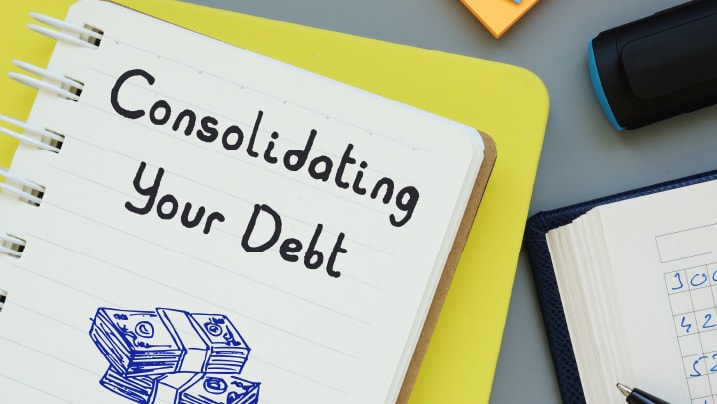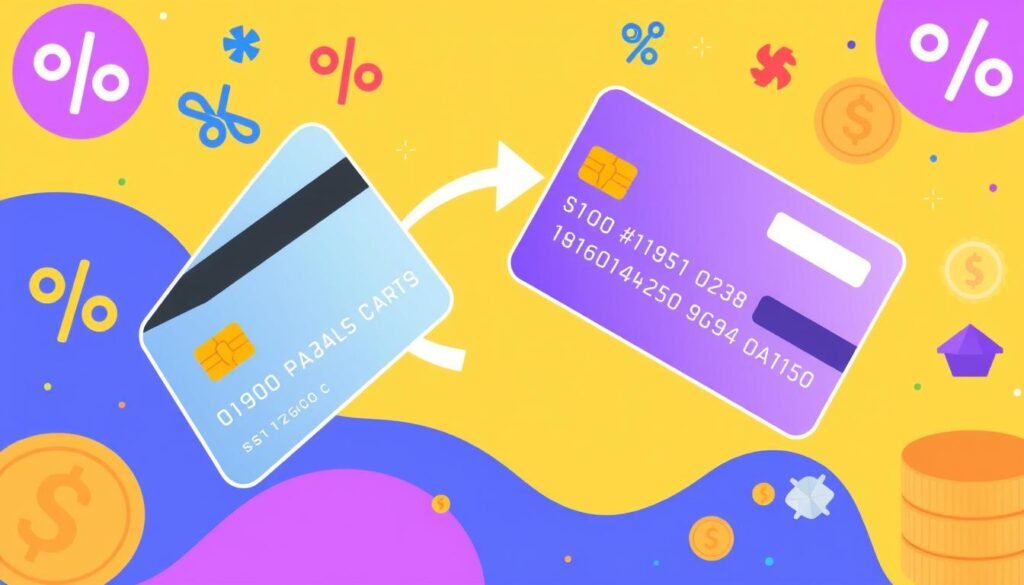Debt consolidation is a way to manage high-interest debt. It combines several debts into one, often with a lower interest rate. This makes paying back easier and can save money on interest.
Debt consolidation works best when the new loan’s interest is lower than the old ones. It simplifies your finances, lowers interest rates, and can help pay off debt faster. This makes it a valuable tool for those with many high-interest debts.
But, it’s important to understand how debt consolidation works. You should also think carefully about whether it’s right for you before getting a loan. This article will cover the basics of debt consolidation loans, their pros and cons, and help you decide if it’s good for you.
Key Takeaways
- Debt consolidation combines multiple loans or debts into a single, lower-interest loan or line of credit.
- Debt consolidation can simplify finances, reduce interest costs, and potentially help pay off debt faster.
- It’s essential to only consider a debt consolidation loan if you’re offered a lower interest rate than your previous loans.
- Many debt consolidation loans have fixed interest rates, providing predictable monthly payments.
- Debt consolidation can be a useful tool, but it’s important to carefully evaluate your financial situation and the terms of the loan before making a decision.
Understanding Debt Consolidation Loans
Debt consolidation can help manage multiple debts like credit card balances and student loans. It combines these into one monthly payment. This can save money on interest and make paying off debt easier.
What is Debt Consolidation?
Debt consolidation means getting a new loan to pay off existing debts. This new loan often has a lower interest rate and better repayment terms. It aims to save money and simplify debt repayment.
How Does Debt Consolidation Work?
The debt consolidation process involves a few steps:
- Assess your current debts: Collect info on each debt’s balance, interest rate, and monthly payment.
- Apply for a debt consolidation loan: Look for a loan with a lower interest rate than your current debts. This could be a personal loan, home equity loan, or balance transfer credit card.
- Use the new loan to pay off existing debts: After approval, use the loan funds to clear your current debts, like credit cards and student loans.
- Make a single monthly payment: You’ll now have one monthly payment for your consolidated debt instead of many.
Consolidating debts can save on interest and make repayment more efficient. But, make sure the consolidation loan fits your long-term financial plans.
Debt Consolidation vs. Personal Loan

When managing debt, people often look at two main options: debt consolidation loans and personal loans. It’s crucial to know how they differ.
A debt consolidation loan aims to combine multiple debts into one monthly payment. It usually has a lower interest rate than the combined rates of existing debts. This can make paying off debt easier and cheaper in the long run.
A personal loan, on the other hand, is a loan for various needs, including debt consolidation. It has fixed interest rates and repayment terms. This makes monthly payments predictable. Personal loans can be used for many things, not just debt consolidation.
| Debt Consolidation Loan | Personal Loan |
|---|---|
| Designed specifically for consolidating multiple debts | Versatile loan that can be used for various purposes, including debt consolidation |
| Typically offers lower interest rates compared to existing debts | Interest rates based on borrower’s creditworthiness |
| Streamlines payments into a single monthly obligation | Provides a fixed repayment term and consistent monthly payments |
| Loan approval depends on credit score, income, and debt-to-income ratio | Loan approval also considers credit score, income, and debt-to-income ratio |
In summary, debt consolidation loans and personal loans both help with debt. But, they serve different purposes. Debt consolidation loans are made for simplifying debt repayment and saving on interest. Personal loans are more flexible, good for many financial needs, including debt consolidation.
Managing a Debt Consolidation Loans

After getting a debt consolidation loan, it’s key to not get more debt. New debt can mess up your plan and make things worse. It’s vital to stay disciplined and avoid new debt for your debt consolidation to work.
It’s also important to keep up with your debt consolidation loan payments. Paying on time helps avoid extra fees and keeps your credit score healthy. Setting up automatic payments can help you never miss a payment.
Avoiding Additional Debt
- Debt payments (including mortgage, car loan or lease, credit card balances, and other debt) that are more than 35% of gross income indicate a need to actively manage and reduce debt.
- Late payments on monthly bills are a sign that debt management is necessary.
- Making only the minimum payment on credit card bills can signal financial strain.
- Reaching the available credit limits on credit cards can indicate a high level of debt.
- Being denied credit recently suggests potential financial difficulties.
Staying on Top of Payments
- Determine how much extra money can be budgeted each month towards debt reduction.
- Consider using popular debt repayment strategies, such as paying off balances with the highest interest rates first or paying off the lowest balances first.
- Enroll in a nonprofit debt consolidation program, which typically offers reduced interest rates around 8%, sometimes less, with a one-time setup fee between $50-$75 and a monthly service fee averaging $32.
- Explore debt consolidation loans, which usually come with origination fees ranging from 1%-8% of the loan amount.
“Debt consolidation combines high-interest credit card bills into a single monthly payment at a reduced interest rate.”
Is a Debt Consolidation Loan Right for You?

Managing debt can be tough, but a debt consolidation loan might help. These loans often have lower interest rates than credit cards. They offer a fixed plan to pay off your debt, making things simpler. But, you should think carefully before choosing this option.
Here are some things to consider:
- Loan Eligibility: You usually need a good credit score, at least 670, to get a good deal. If your credit is fair or poor, you might pay more in interest, making payments hard to handle.
- Interest Rates: Debt consolidation loans usually have lower rates than credit cards. This can save you money and help you pay off debt faster. The average rate for personal loans is 9.41%, while credit cards average around 16%.
- Monthly Payments: Loans with fixed terms offer a clear plan to pay off your debt. This might be better than the revolving credit of credit cards.
- Financial Situation: Look at the total cost of the loan compared to your current payments. If the loan doesn’t save you money, it might not be the best choice.
Choosing between a debt consolidation loan and other options depends on your financial situation. It’s important to research well and talk to a financial expert before deciding.
| Debt Consolidation Loan | Credit Card |
|---|---|
| Competitive interest rates (9.41% average) | Higher interest rates (16% average) |
| Structured repayment plan | Revolving credit with no set payoff plan |
| May have a positive impact on credit score by improving credit utilization | Can negatively impact credit score if credit card accounts are closed |
By looking closely at your debt consolidation loan options and your financial situation, you can decide if this is the right choice for you.
Debt Consolidation Loans: Pros and Cons
Debt consolidation loans have both good and bad sides. It’s important to know the benefits and drawbacks before deciding.
Advantages of Debt Consolidation Loans
One big plus is getting lower interest rates. As of October 2024, credit card rates are about 20.70%. Personal loan rates are around 12.43%. This means you could save a lot on interest.
Another benefit is simplified monthly payments. You only have to worry about one payment each month. This makes it easier to stay on top of your finances and can help your credit score.
Disadvantages of Debt Consolidation Loans
A downside is the risk of extending the repayment term. Even with lower monthly payments, the loan might last longer. This could mean paying more in interest over time.
Also, there might be closing costs or fees like origination fees. These can eat into your savings. And, using home equity for a loan can risk losing your home if you can’t pay back the loan.
Types of Debt Consolidation Options

There are many ways to consolidate debt. Two popular options are credit card balance transfers and home equity loans. Knowing the good and bad of each can help you choose the right one for you.
Credit Card Balance Transfers
One way to consolidate debt is through credit card balance transfers. This means moving debt from several cards to one with a lower interest rate. Often, this rate is 0% for a short time. But, there are fees, usually 3% to 5% of the amount moved.
Also, the low rate might not last forever. After a certain time, the rate could go up, leading to more interest charges.
The best balance transfer cards offer 0% or very low interest for up to 18 months. They usually have a fee of 3 to 5 percent of the amount moved.
Home Equity Loans
Another option is a home equity loan. It lets you use your home’s equity to pay off other debts. Home equity loans might have lower interest rates. But, there’s a big risk: losing your home if you can’t make payments.
Home equity loans and HELOCs offer big amounts and long repayment times. Debt consolidation loans can be based on your credit score.
Also Read: Effective Loan Refinancing Strategies To Save On Interest Rates
“Careful consideration of the potential risks and benefits is crucial when exploring home equity-based debt consolidation options.”
Conclusion
Debt consolidation loans can help simplify paying off debts and lower interest costs. They combine several debts into one easy payment. This makes managing finances easier and speeds up the path to being debt-free.
But, it’s important to think carefully about your financial situation before choosing this option. Look at different debt consolidation choices and make sure they fit your financial planning goals.
Doing your homework and understanding the debt management process is key. Consider your credit score, interest rates, loan terms, and how it might affect your credit history. This helps you decide if a debt consolidation loan is right for you.
In the end, debt consolidation can be a great way to manage debt. But, it’s not for everyone. By learning about it and making a smart choice, you can handle your debt better and look forward to a more stable financial future.
FAQs
Q: What is a debt consolidation loan and how does it work?
A: A debt consolidation loan is a type of loan that allows you to combine multiple debts, such as credit card debt, into a single payment. This can help simplify your finances and potentially lower your monthly payment by securing a lower interest rate.
Q: How can I get a debt consolidation loan?
A: To get a debt consolidation loan, you typically need to apply through a lender, such as a bank or credit union. You’ll need to provide information about your debts, income, and credit score. Once approved, you can use the loan to pay off your existing debts.
Q: What are the loan rates for debt consolidation?
A: Loan rates for debt consolidation vary based on your credit score, the lender, and the type of loan you choose. Generally, borrowers with excellent credit can secure the best debt consolidation loan rates, which can significantly lower the overall cost of borrowing.
Q: Can I use a personal loan for debt consolidation?
A: Yes, a personal loan for debt consolidation is a common option. By securing a personal loan, you can consolidate your debt into one loan, which may come with a fixed rate and lower monthly payments compared to your existing debts.
Q: How do debt consolidation loan rates affect my monthly payment?
A: Debt consolidation loan rates directly influence your monthly payment amount. Lower rates result in lower monthly payments, making it easier to manage your finances. It’s essential to compare loan offers to find the best rates available.
Q: Will taking out a debt consolidation loan affect my credit score?
A: Taking out a debt consolidation loan can affect your credit score in several ways. Initially, a hard credit check may lower your score slightly. However, if you make timely payments on the loan and reduce your credit utilization ratio, it can positively impact your credit in the long run.
Q: What is the minimum credit score required for a debt consolidation loan?
A: The minimum credit score required for a debt consolidation loan varies by lender. Generally, lenders prefer a score of at least 620, but some may offer loans to those with lower scores, albeit with higher interest rates.
Q: How can I use a debt consolidation calculator?
A: A debt consolidation calculator helps you estimate your potential monthly payment and total interest costs when consolidating debt. By inputting your current debts, interest rates, and the loan amount, you can see how consolidating could impact your finances.
Q: What are the benefits of consolidating credit card debt?
A: Consolidating credit card debt can provide several benefits, including lower interest rates, simplified monthly payments, and a structured repayment plan that can help you pay off your debt faster and achieve debt relief.
Source Links
- https://www.consumerfinance.gov/ask-cfpb/what-do-i-need-to-know-if-im-thinking-about-consolidating-my-credit-card-debt-en-1861/
- https://www.bankrate.com/loans/personal-loans/how-debt-consolidation-loans-work/
- https://www.investopedia.com/terms/d/debtconsolidation.asp
- https://www.equifax.com/personal/education/debt-management/articles/-/learn/what-is-debt-consolidation/

